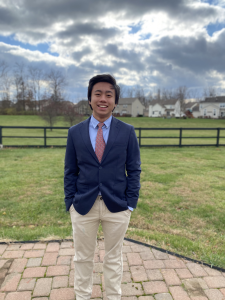This is part of a series of posts by recipients of the 2021 Career Services Summer Funding Grant. We’ve asked funding recipients to reflect on their summer experiences and talk about the industries in which they spent their summer. You can read the entire series here.
This entry is by Michael Wang, COL ’24
 During my internship over the summer, I had the amazing opportunity to work at the Ruella Lab at the Center for Cellular Immunotherapies at Penn Medicine. The Ruella Lab is focused on the mechanisms of relapse after chimeric antigen receptor T cell (CART) immunotherapy with the goal of designing innovative next-generation immunotherapies for relapsing/refractory leukemia and lymphoma. I was fortunate enough to work under Dr. Ruella as well as my lab mentors to learn more about specific lab techniques while at the same time learning more about CAR-T immunotherapy.
During my internship over the summer, I had the amazing opportunity to work at the Ruella Lab at the Center for Cellular Immunotherapies at Penn Medicine. The Ruella Lab is focused on the mechanisms of relapse after chimeric antigen receptor T cell (CART) immunotherapy with the goal of designing innovative next-generation immunotherapies for relapsing/refractory leukemia and lymphoma. I was fortunate enough to work under Dr. Ruella as well as my lab mentors to learn more about specific lab techniques while at the same time learning more about CAR-T immunotherapy.
Before going into the lab, I had minimal wet-lab experience and certainly not enough to understand CART immunotherapy, a form of immunotherapy that uses specifically altered T cells to fight cancer. During my expereince, I conducted research on specific novel approaches for effective immunotherapies for T-cell malignancies. Specifically, I helped conduct research to learn more on developing a new anti-CD19 CAR T cell therapy using scFv AT101 to overcome tumor escape by conventional CART19. There are many mechanisms of resistance against CAR-T therapy, such as the deletion of a specific epitope that CAR19 binds to. The idea of the project was to generate a CAR T cell that binds to CD19, but on a separate epitope of the protein. I am very grateful for my mentors as well as Dr. Ruella for helping me learn more about the specific mechanisms and pathways that CART therapy works.
While I was learning more about the mechanism behind CAR-T therapy and, in general, the world of immunology, I also became trained in more lab techniques important for all wet-lab research. For example, I learned cell culturing, flow cytometry, transfection, transduction, bacterial transformation, and cloning. I am thankful to have received a generous grant from Career Services, which I was able to use for transportation to the lab and living expenses for giving me the chance to become trained in these valuable skills that will forever be helpful in my future career as a scientist.
As someone who is very passionate about pursuing a career in medicine and research, the research experience has provided me great insight on how research plays such an important role in the field of medicine. My mentors were extremely encouraging and I have been so grateful for all the times where I repeatedly would ask questions in order to understand a certain concept about immunology. These relationships that I have built throughout my experience made me excited to go into the lab everyday for the opportunity to learn something new.
This summer has provided me with a lot of insight as to what the research field is like and the amount of hard work that goes into getting results. I am more motivated than ever to pursue a career in medicine and translational research. I plan to continue to work in the Ruella Lab for the next few years to understand more about CART immunotherapy.




